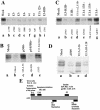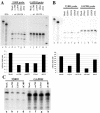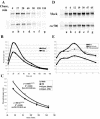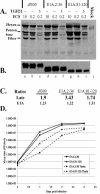Transforming growth factor beta1 receptor II is downregulated by E1A in adenovirus-infected cells
- PMID: 12915548
- PMCID: PMC187388
- DOI: 10.1128/jvi.77.17.9324-9336.2003
Transforming growth factor beta1 receptor II is downregulated by E1A in adenovirus-infected cells
Abstract
Transforming growth factor beta1 (TGF-beta1) signaling is compromised in many tumors, thereby allowing the tumor to escape the growth-inhibitory and proapoptotic activities of the cytokine. Human adenoviruses interfere with a number of cellular pathways involved in cell cycle regulation and apoptosis, initially placing the cell in a "tumor-like" state by forcing quiescent cells into the cell cycle and also inhibiting apoptosis. We report that adenovirus-infected cells resemble tumor cells in that TGF-beta1 signaling is inhibited. The levels of TGF-beta1 receptor II (TbetaRII) in adenovirus-infected cells were decreased, and this decrease was mapped, by using virus mutants, to the E1A gene and to amino acids 2 to 36 and the C-terminal binding protein binding site in the E1A protein. The decrease in the TbetaRII protein was accompanied by a decrease in TbetaRII mRNA. The decrease in TbetaRII protein levels in adenovirus-infected cells was greater than the decrease in TbetaRII mRNA, suggesting that downregulation of the TbetaRII protein may occur through more than one mechanism. Surprisingly in this context, the half-lives of the TbetaRII protein in infected and uninfected cells were similar. TGF-beta1 signaling was compromised in cells infected with wild-type adenovirus, as measured with 3TP-lux, a TGF-beta-sensitive reporter plasmid expressing luciferase. Adenovirus mutants deficient in TbetaRII downregulation did not inhibit TGF-beta1 signaling. TGF-beta1 pretreatment reduced the relative abundance of adenovirus structural proteins in infected cells, an effect that was potentiated when cells were infected with mutants incapable of modulating the TGF-beta signaling pathway. These results raise the possibility that inhibition of TGF-beta signaling by E1A is a means by which adenovirus counters the antiviral defenses of the host.
Figures






Similar articles
-
Solar ultraviolet irradiation reduces collagen in photoaged human skin by blocking transforming growth factor-beta type II receptor/Smad signaling.Am J Pathol. 2004 Sep;165(3):741-51. doi: 10.1016/s0002-9440(10)63337-8. Am J Pathol. 2004. PMID: 15331399 Free PMC article.
-
Novel permissive role of epidermal growth factor in transforming growth factor beta (TGF-beta) signaling and growth suppression. Mediation by stabilization of TGF-beta receptor type II.J Biol Chem. 2006 Mar 24;281(12):7765-74. doi: 10.1074/jbc.M511781200. Epub 2006 Jan 20. J Biol Chem. 2006. PMID: 16428382
-
Restoration of transforming growth factor beta signaling pathway in human prostate cancer cells suppresses tumorigenicity via induction of caspase-1-mediated apoptosis.Cancer Res. 1999 Mar 15;59(6):1366-71. Cancer Res. 1999. PMID: 10096572
-
TGF-betas and TGF-beta receptors in atherosclerosis.Cytokine Growth Factor Rev. 2000 Mar-Jun;11(1-2):103-14. doi: 10.1016/s1359-6101(99)00034-9. Cytokine Growth Factor Rev. 2000. PMID: 10708958 Review.
-
Emerging roles for TGF-beta1 in nervous system development.Int J Dev Neurosci. 2005 Aug;23(5):413-24. doi: 10.1016/j.ijdevneu.2005.04.001. Int J Dev Neurosci. 2005. PMID: 15936920 Review.
Cited by
-
Kaposi's sarcoma-associated herpesvirus-encoded microRNA miR-K12-11 attenuates transforming growth factor beta signaling through suppression of SMAD5.J Virol. 2012 Feb;86(3):1372-81. doi: 10.1128/JVI.06245-11. Epub 2011 Oct 19. J Virol. 2012. PMID: 22013049 Free PMC article.
-
KSHV LANA inhibits TGF-beta signaling through epigenetic silencing of the TGF-beta type II receptor.Blood. 2008 May 1;111(9):4731-40. doi: 10.1182/blood-2007-09-110544. Epub 2008 Jan 16. Blood. 2008. PMID: 18199825 Free PMC article.
-
A Kaposi's sarcoma-associated herpesvirus microRNA and its variants target the transforming growth factor β pathway to promote cell survival.J Virol. 2012 Nov;86(21):11698-711. doi: 10.1128/JVI.06855-11. Epub 2012 Aug 22. J Virol. 2012. PMID: 22915806 Free PMC article.
-
Viruses as key modulators of the TGF-β pathway; a double-edged sword involved in cancer.Rev Med Virol. 2018 Mar;28(2):e1967. doi: 10.1002/rmv.1967. Epub 2018 Jan 18. Rev Med Virol. 2018. PMID: 29345394 Free PMC article. Review.
-
Adenovirus E1A and E1B-19K proteins protect human hepatoma cells from transforming growth factor beta1-induced apoptosis.Virus Res. 2010 Jan;147(1):67-76. doi: 10.1016/j.virusres.2009.10.008. Epub 2009 Oct 23. Virus Res. 2010. PMID: 19854227 Free PMC article.
References
-
- Adnane, J., E. Seijo, Z. Chen, F. Bizouarn, M. Leal, S. M. Sebti, and T. Munoz-Antonia. 2002. RhoB, not RhoA represses the transcription of the transforming growth factor β type II receptor by a mechanism involving activator protein 1. J. Biol. Chem. 277:8500-8507. - PubMed
-
- Benedict, C., P. Norris, T. Prigozy, J. L. Bodmer, J. A. Mahr, C. Garnett, F. Martinon, J. Tschopp, L. R. Gooding, and C. F. Ware. 2001. Three adenovirus E3 proteins cooperate to evade apoptosis by tumor necrosis factor-related apoptosis-inducing ligand receptor-1 and -2. J. Biol. Chem. 276:3270-3278. - PubMed
-
- Bishopric, N. H., G.-Q. Zeng, B. Sato, and K. A. Webster. 1997. Adenovirus E1A inhibits cardiac myocyte-specific gene expression through its amino terminus. J. Biol. Chem. 272:20584-20594. - PubMed
Publication types
MeSH terms
Substances
Grants and funding
LinkOut - more resources
Full Text Sources
Miscellaneous

